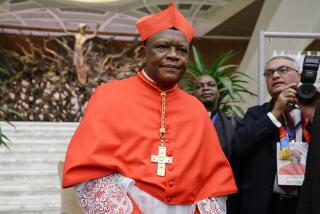Anglican leaders urge easing of differences
- Share via
Leaders of the global Anglican Communion responded largely positively Wednesday to pledges from the Episcopal Church to use restraint in consecrating gay bishops and other contentious matters.
But an influential joint standing committee of Anglican bishops, clergy and lay leaders also called on all sides in the continuing debate over homosexuality and biblical authority to work harder to ease their differences and keep the 77-million-member Anglican Communion intact. The Episcopal Church is the U.S. branch of Anglicanism.
The panel’s report to Archbishop of Canterbury Rowan Williams, the Anglican Communion’s spiritual leader, came in response to a statement by Episcopal bishops last week at a meeting in New Orleans.
The Episcopal Church has been under intense pressure to roll back its comparatively liberal stance on homosexuality since 2003, when it consecrated V. Gene Robinson, a gay man living with his partner, as bishop of New Hampshire.
Meeting in Tanzania in February, the Anglican Communion’s top bishops, called primates, asked the Episcopal Church to state clearly by Sept. 30 that it would stop consecrating openly gay bishops and bar official blessings for same-sex couples, or risk a diminished role in the worldwide fellowship.
In response, the Episcopal bishops last week reiterated and clarified earlier promises to “exercise restraint” in approving another openly gay bishop and to refrain from authorizing official rites of blessing for gay couples. The bishops did not explicitly state they would not consecrate another gay bishop, however.
The compromise appeared to satisfy few on either end of the theological spectrum. Some theological conservatives said the bishops’ response fell far short of meeting the primates’ demands. Some liberals said the bishops had abandoned gay rights and church members in a bid for unity.
In its report, however, the Anglican panel said the bishops’ pledges had “clarified all outstanding questions” and given the needed assurances.
At the same time, the panel urged the Episcopal Church to do more to provide pastoral care and oversight to disaffected conservatives within its ranks. At least four dioceses, including Fresno-based San Joaquin, are taking steps to break with the national church and align with conservative Anglican bishops abroad. More than 50 Episcopal parishes, including several in Southern California, have done the same.
Unless adequate reassurances can be given to dissident congregations and dioceses, “there will be no reconciliation either within the Episcopal Church or within the wider Anglican Communion,” the report said.
But the panel also appeared to rebuke several Anglican primates who had established networks of breakaway Episcopal parishes in the United States, calling for an end to such practices. “We believe that the time is right for a determined effort to bring interventions to an end,” the report stated.
The presiding bishop of the Episcopal Church, the Most Rev. Katharine Jefferts Schori, said in a statement Wednesday that she was pleased with the committee’s finding that the church had fulfilled the primates’ requests.
The report “has recognized the hard work of the House of Bishops and that our responses reflect our repeatedly expressed desire to remain in full communion with the rest of the Anglican Communion,” she said.
The archbishop of Canterbury has asked the primates to respond to the report by month’s end.
--
More to Read
Sign up for Essential California
The most important California stories and recommendations in your inbox every morning.
You may occasionally receive promotional content from the Los Angeles Times.













